外研版 高一英语 必修一 Module1 语法总结
外研社版高中英语必修一第一单元知识点总结

My First Day at Senior High第一部分语法一时态1)一般现在时A构成(动词的变化)主语是第一,二或者复数的时候用动词的原形。
i feel very happy. We feel very happy.主语为单数第三人称的时候,动词加s 或者es(原音结尾)。
辅音+y时把y变成I 再加es.She feels very happy. She goes to school every day. Carry--- carries study---studiesB 用法4种1 表示经常性习惯性反复性发生的动作。
我们每天吃三顿饭。
We have three meals every day.妈妈每天晚上8点睡觉。
My mother goes to bed at 8every night.一般现在时常与时间状语连用,如usually, often, always, everyday, sometimes, once a month,on Mondays.2 表示客观事实或普遍真理。
太阳从东方升起。
The sun rises in the East.知识就是力量。
Knowledge is power.3 表示现在时刻发生的动作或存在的状态。
车来啦!Here comes the bus.我感觉很累。
I feel very tired .4 按照时间表,计划,规定将要发生的事。
常与动词; go, come, arrive ,leave, start, begin 等连用。
e.g.火车8点30发车,9点30到达。
The train leaves at 8:30 and arrives at 9:30.考试易错题型:e.g.如果明天是晴天,我们将去野餐。
If it will be fine tomorrow, we will go on a picnic. 错,在条件状语从句中和时间状语从句中,从句如表示将来的动作,用一般现在时代替。
高中英语 外研版必修第一册Unit1语言知识点归纳总结
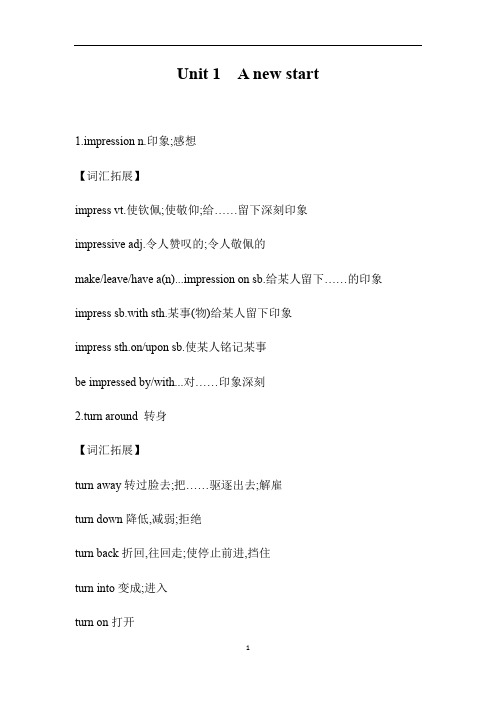
Unit 1 A new start1.impression n.印象;感想【词汇拓展】impress vt.使钦佩;使敬仰;给……留下深刻印象impressive adj.令人赞叹的;令人敬佩的make/leave/have a(n)...impression on sb.给某人留下……的印象impress sb.with sth.某事(物)给某人留下印象impress sth.on/upon sb.使某人铭记某事be impressed by/with...对……印象深刻2.turn around 转身【词汇拓展】turn away转过脸去;把……驱逐出去;解雇turn down降低,减弱;拒绝turn back折回,往回走;使停止前进,挡住turn into变成;进入turn on打开turn off关掉turn out生产;出产;结果是turn over反转;翻过来;翻身;移交turn to向……求助;翻到(书页);开始行动turn up把……向上翻;卷起;出现,到来3.breathe v.呼吸【词汇拓展】breath n.呼吸;气息breathe in/out 吸气/呼气out of breath上气不接下气take a deep breath深吸一口气hold one’s breath屏住呼吸4.in panic惊慌地【词汇拓展】get into a panic陷入惊慌中panic sb.into doing sth.使某人仓皇行事;使某人仓促行动There’s no panic.不用着急。
There’s no point getting into a panic about the exam.It’s not as difficult as you imagine.5.embarrassed adj.尴尬的;难堪的【词汇拓展】embarrass vt.使尴尬;使难堪;使窘迫embarrassing adj.令人尴尬的;令人困窘的embarrassment n.窘迫;令人困窘的人或物to one’s embarrassment 令某人尴尬的是6.fit adj.健康的;强健的;合适的v.适合;合身;安装【词汇拓展】be fit for适合;胜任be fit to do适合做……keep/stay fit保持健康fit in with与……相适应,与……相协调注意:(1)fit指大小、尺寸、形状合适,引申为“吻合”;(2)suit指款式、需要、口味、条件、地位、衣着适合某人,使人看上去有吸引力;另外,用于比喻意义时多用suit;(3)match多指大小、颜色、形状等一致,通常被译为“匹配”。
高中英语外研版必修第一册Unit1重点句型归纳总结

⾼中英语外研版必修第⼀册Unit1重点句型归纳总结Unit 1 A new start1.What was your first impression of your new school?你对新学校的第⼀印象如何?【词汇精讲】impression是名词,意为“印象;感想”。
2.Turning around,I saw a white-haired man.我转过⾝来,看见⼀位⽩发男⼦。
【词汇精讲】句中的turn around是动词短语,意为“转⾝”,是⼀个不及物动词短语。
3.With butterflies in my stomach,I breathed deeply.⼼⾥七上⼋下,我深吸了⼀⼝⽓。
4.I looked at them in panic.我惊慌地看着他们。
5.Although I was embarrassed,his words made me a lot more relaxed.虽然我很尴尬,但他的话让我放松了很多。
6.I was looking at the photos on the noticeboard when I heard a voice behind me.我正在看布告栏上的照⽚,突然听到⾝后有个声⾳。
【句式剖析】这是⼀个sb.was/were doing sth.when...句型,其中的when 是并列连词,意为“在那时”,相当于and then或and at the same time。
【句式拓展】when作并列连词时常⽤于以下句型中:be doing sth.when...正在做……这时……be about to do sth.when...=be on the point of doing sth.when...正要做……这时……had just done sth.when...刚做了……这时……We were about to set out when it began to rain.=We were on the point of setting out when it began to rain.我们正要出发,这时天开始下⾬。
外研版高中英语必修一Module1知识点总结
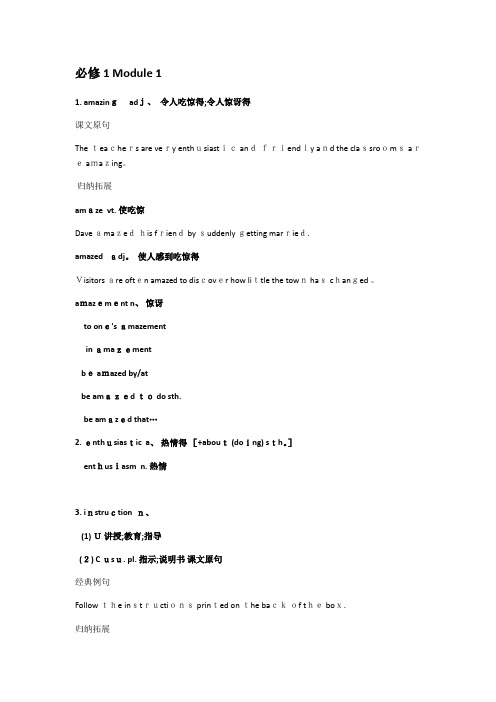
必修1 Module 11. amazingadj、令人吃惊得;令人惊讶得课文原句The teachers are very enthusiastic andfriendly and the classrooms are amazing。
归纳拓展amaze vt. 使吃惊Dave amazedhis friend by suddenly getting married.amazed adj。
使人感到吃惊得Visitors are often amazed to discover how little the town has changed 。
amazement n、惊讶to one's amazementin amazementbe amazed by/atbe amazed to do sth.be amazed that…2. enthusiastic a、热情得[+about (doing) sth。
]enthusiasm n. 热情3. instruction n、(1) U讲授;教育;指导(2) C usu. pl. 指示;说明书课文原句经典例句Follow the instructions printed on the backof the box.归纳拓展(1)follow instructions 服从指示under one’s instruction在某人得指导下(2)instruct vt。
指导;教导;命令instruct sb。
to do sth、instruct sb. in sth、教授某人某方面得内容例句:You will receive basic instructions in navigation、4、 attitude n、态度;瞧法;姿态课文原句Describe your attitude to studying English、经典例句He has a bad attitude towards his schoolwork、As soon as they found out I was a doctor their whole attitude changed、归纳拓展attitude to/toward(s) sb、/sth. 对…得瞧法/态度have a positive/negative attitude to/ towardssb、/ sth。
外研社高中英语必修一Module所有重点归纳

1 How ’s it going?2 cover :包含,包含● be covered with 被 覆盖3 at the end of在结束的时候Eg : Class 5 is at the end of the corridor.● in the end = at last 最后,终于(一般时态) Eg: I am sure I will win in the end.● by the end of 到为止 (后用达成时态 )Eg :① By the end of this term, we will have learnt two English books.② By the end of last year, we had finished our task.● end up with 以告终4 receive 客观上收到 ; accept 主观上收到 Eg :I received his invitation but did not accept it.5 divide :区分,把整体分为若干部分Eg :The world is divide into five continents.※比较separate :分开,把本来连在一同或凑近的分分开来6 表参加活动的短语:take part in + 活动join the partyjoin in the gameattend + the meeting7. The teachers are very enthusiastic and friendly and the classrooms are amazing.表示“惊讶”的几个单词:◆ surprise 指“因为预料以外而感觉惊诧或惊诧” 。
Eg: His coming surprised me. ◆ astonish 指“因为预料以外而又不可以理解而感觉惊讶”,语意较强。
Eg: I was astonished to see he got up so early.◆ amaze 指“因为以为仿佛不行能或很少可能发生的事的出现而感觉大为惊诧、疑惑不解”,语意较强。
外研版高中英语必修一Module1 My First Day at Senior High总结
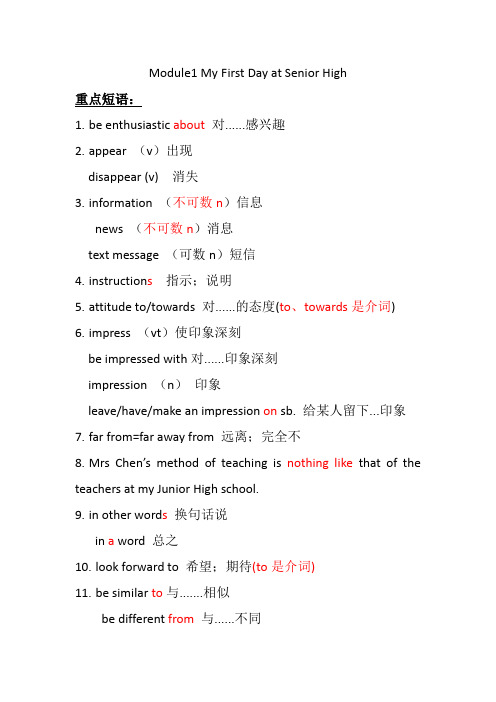
Module1 My First Day at Senior High重点短语:1.be enthusiastic about对......感兴趣2.appear (v)出现disappear (v) 消失rmation (不可数n)信息news (不可数n)消息text message (可数n)短信4.instruction s指示;说明5.attitude to/towards 对......的态度(to、towards是介词)6.impress (vt)使印象深刻be impressed with对......印象深刻impression (n)印象leave/have/make an impression on sb. 给某人留下...印象7.far from=far away from 远离;完全不8.Mrs Chen’s method of teaching is nothing like that of the teachers at my Junior High school.9.in other word s换句话说in a word 总之10.look forward to 希望;期待(to是介词)11.be similar to与.......相似be different from与......不同be the same as与......一样12.courage (n)努力encourage sb. to do sth. 鼓励某人做... encouragement (n)鼓励13.fluency (n)流利fluent (adj)流利的fluently (adv)流利地14.move (v)移动;搬家remove (v)移除15.at the start of 在......开始的时候at the beginning of 在......开始的时候at the end of 在......结束的时候16.Would you mind doing sth. 你介意做......吗?mind doing sth. 介意做...17.cover (vt)包含18.divide...into...把......分成be divided into 被分成19.take part in 参加join in 加入20.go to college 上大学21.have fun doing sth 玩得开心重点句型:1.倍数表达法:① A+be+倍数+as+形容词原级+as+B②A+be+倍数+形容词比较级+than+B③A+be+倍数+the+n(size, length,height,depth,size)+of+B注: half(一半), double(两倍), twice(两倍), times(三倍及以上),2.so的用法So do I. 我也是So I do. 我确实是重点语法:动词+ing变为形容词“感到......的”动词+ed变为形容词“令人......的”e.g.He has a ________(frighten) look on his face.(frighened/frightening)He has an_________(amaze) expression on his face.(amazing/amazed)* to one’s +名词“另某人......的是”(e.g to my surprise, to my amazement)。
高一英语必修一外研版每单元语法经典总结

Module 1 My First Day at Senior HighGrammar 2:分词形容词英语中有些形容词是由动词的---ing 构成的(通常表示事物给人的感觉,意为“是令人感到…..的”),有些形容词是由动词的------ed 构成的(通常表示人对事物的感觉,意为“对……感到……的”)。
前者表示主动的意义,后者表示被动的意义。
由于他们的形式与现在分词和过去分词完全一样,故又称它们为“分词形容词”,在句中做表、定、状、补等成分。
常见的有:amazing ---- amazed amusing ---- amused astonishing---- astonished frighting-------frightenedboring- ---bored confusing-- confused disappointing—disappointed moving ------moveddisturbing - disturbed discouraging-- discouraged encouraging –encouraged tiring------tiredModule 2 My New TeachersGrammar:后接V-ing的动词(1)英语中有很多的动词后只跟动名词作宾语:如advise, consider, admit, appreciate, mind , avoid, excuse, delay, imagine, deny, enjoy, keep(on), practice, resist, escape , risk , put off, explain, quit(停止),tolerate, pardon, allow, forbid, miss (错过),suggest, advise, recommend, finish, envy, can’t help(2)有一类动词后直接跟动名词形式作宾语;如果后面跟名词、代词加宾补,则宾补用不定式‘这类常见的可记忆为“阿福的帽子”:FU’S CAP : allow, forbid, understand, suppose, consider, advise, permittedeg: ①W e don’t allow using mobile phone here.②W e don’t allow him to use mobile phone here.③He is not allowed to use mobile phone here.(3)“动词+ 介词”构成的短语,其后往往跟动名词作宾语。
外研版必修一册Unit1重点句式和语法讲解
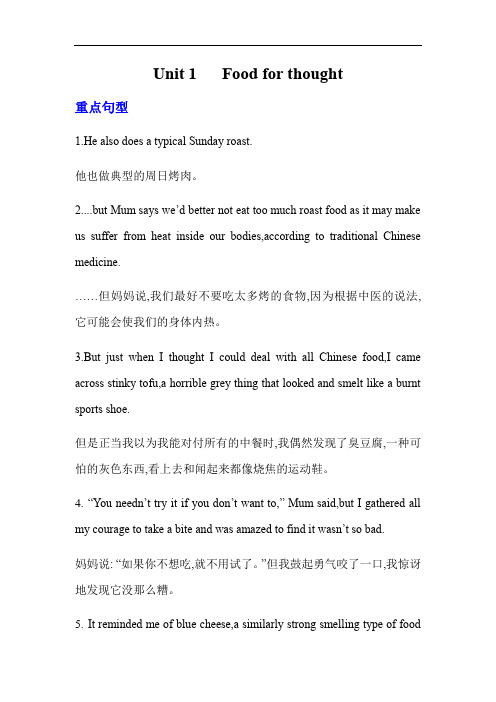
Unit 1 Food for thought重点句型1.He also does a typical Sunday roast.他也做典型的周日烤肉。
2....but Mum says we’d better not eat too much roast food as it may make us suffer from heat inside our bodies,according to traditional Chinese medicine.……但妈妈说,我们最好不要吃太多烤的食物,因为根据中医的说法,它可能会使我们的身体内热。
3.But just when I thought I could deal with all Chinese food,I came across stinky tofu,a horrible grey thing that looked and smelt like a burnt sports shoe.但是正当我以为我能对付所有的中餐时,我偶然发现了臭豆腐,一种可怕的灰色东西,看上去和闻起来都像烧焦的运动鞋。
4.“You needn’t try it if you don’t want to,” Mum said,but I gathered all my courage to take a bite and was amazed to find it wasn’t so bad.妈妈说: “如果你不想吃,就不用试了。
”但我鼓起勇气咬了一口,我惊讶地发现它没那么糟。
5.It reminded me of blue cheese,a similarly strong smelling type of foodyou either love or hate.这让我想起了蓝奶酪,一种你要么喜欢,要么讨厌的有相似强烈气味的食物。
6.1....I’ve enjoyed food from both countries ever since I was able to holda knife and fork—and chopsticks!……自从我能拿着刀叉和筷子以来,我一直享受着两国的食物!7.He once told me he was surprised by what he saw on the table when he first visited my mother’s parents in China.他曾经告诉我,当他第一次去中国看望我母亲的父母时,他对桌上的情景感到惊讶。
外研版高一必修一module1知识点

外研版高一必修一module1知识点外研版高一必修一Module 1 知识点Module 1 知识点概述:Module 1 是高中英语必修一课程的第一个模块,主要介绍了关于国际友谊和文化差异的知识点。
通过学习本模块的内容,我们可以了解不同国家的文化特点,培养跨文化交流的能力,拓宽我们的国际视野。
一、国家与国家之间的友谊与合作1. 国内外友好交流:在国际交往中,重视友好交流对于不同国家之间的合作非常重要。
友好交流可以促进国与国之间的互信,增进了解,推动合作,共同发展。
2. 国际组织与合作:国际组织是促进国与国之间友好合作的重要机构。
比如联合国、世界贸易组织等国际组织,它们的目标是维护国际和平与安全,促进各国合作与发展。
二、文化差异与文化交流1. 文化差异的认识:不同国家的文化差异体现在语言、思维方式、宗教信仰、习俗礼仪等方面。
了解文化差异有助于我们更好地进行国际交流与合作。
2. 跨文化交际的重要性:跨文化交际是指跨越语言和文化差异进行有效交流的能力。
跨文化交际能够促进国际友谊,增进彼此理解,有效解决合作中出现的问题。
三、节日与礼仪1. 各国传统节日:不同国家有各种各样的传统节日,比如中国的春节,美国的感恩节,英国的复活节等。
了解各国传统节日有助于增进我们对其他文化的了解。
2. 各国礼仪习俗:礼仪是指特定社会和文化环境下的行为规范。
不同国家的礼仪习俗各有不同,比如中国的鞠躬礼,美国的握手问候等。
了解各国礼仪习俗可以避免文化冲突,增进互相尊重。
四、国际交往技巧1. 跨文化沟通技巧:跨文化沟通需要注意语言表达的准确性和文化敏感度。
避免使用太多的俚语和隐喻,尊重对方的文化习俗和价值观。
2. 解决文化冲突的能力:在国际交往中,不同的文化可能会产生冲突。
解决文化冲突需要双方的宽容和理解,以及寻找双赢的解决方案。
总结:Module 1 的内容主要涉及国际友谊、文化差异和跨文化交际等知识点。
通过学习这些知识点,我们可以更好地理解不同的文化背景,培养国际交往能力,推动国家间的友好合作。
外研版英语必修一Module1-Module3重点知识总结
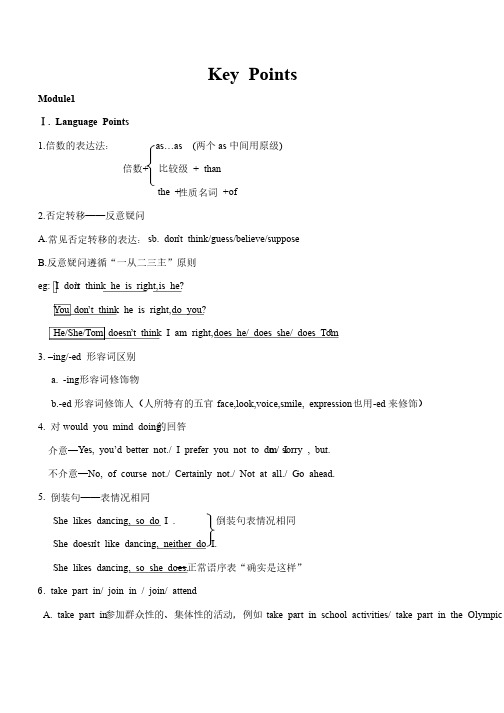
Key Points Module1 Ⅰ. Language Points 1.倍数的表达法:倍数的表达法: as as……as (两个as 中间用原级) 倍数+ 比较级比较级 + than the +性质名词性质名词 +of 2.否定转移——反意疑问否定转移——反意疑问A.常见否定转移的表达:sb. don ’t think/guess/believe/suppose B.反意疑问遵循“一从二三主”原则反意疑问遵循“一从二三主”原则eg: I don ’t think he is right, is he? You don You don’’t think he is right, do you? He/She/Tom doesn He/She/Tom doesn’’t think I am right, does he/ does she/ does Tom ?3. –ing/-ed 形容词区别形容词区别a. -ing 形容词修饰物形容词修饰物b.-ed 形容词修饰人(人所特有的五官face,look,voice,smile, expression 也用-ed 来修饰)来修饰)4. 对would you mind doing 的回答的回答的回答 介意—Yes, you’d Yes, you’d better not./ I prefer you not to do./ I better not./ I prefer you not to do./ I ’m sorry , but … 不介意—No, of course not./ Certainly not./ Not at all./ Go ahead. 5. 倒装句——表情况相同倒装句——表情况相同She likes dancing, so do I . 倒装句表情况相同倒装句表情况相同She doesn’t like dancing, neither do I. She likes dancing, so she does.—正常语序表“确实是这样”—正常语序表“确实是这样”6.6.take part in/ join in / join/ attend A. take part in 参加群众性的、集体性的活动,例如take part in school activities/ take part in the Olympic Games B. join in 参加正在进行的竞赛活动参加正在进行的竞赛活动 常用join sb. (in) doing 参加正在进行的竞赛活动C. join 参加某个组织或团体,例如,join the Party(共产党) / join the league(共青团)/ join the army(参军) D. attend正式用语,常指参加婚葬,会议,典礼,上学,上课等,例如,attend the wedding(婚礼) attend 常指参加婚葬,会议,the funeral(葬礼) attend class(上课) attend school(上学) 7. matter的用法的用法It doesn’t matter if…如果…没关系没关系Does it matter if…如果…有关系吗?有关系吗?It matters a lot if…如果…很要紧很要紧Ⅱ. Key Phrasesat the start/ beginning of 在…的开始/开端的末尾开端 at the end of 在…的末尾attitude to/towards 对…的态度换句话说的态度 in other words换句话说take part in/ join/ join sb. (in) doing/ attend 参加参加divide sth. into = sth. be divided into 划分为把…划分为move to 搬到…look forward to doing 期盼做某事期盼做某事feel/get/be bored with 对…感到厌倦感到厌倦be impressed with 某人对某人对…印象深刻印象深刻…给某人留下深刻印象/…给某人留下难leave a deep impression on/ leave an unforgettable impression on 忘的印象忘的印象用这种方式:in this way in this manner with this method by this means ——————一般现在时Ⅲ. Grammar——————一般现在时1.经常性、习惯性动作用一般现在时经常性、习惯性动作用一般现在时She goes to see the film once a week. He always/often/usually/sometimes/never/seldom talks with others. The teacher said that the earth travels around the sun. The light travels faster than sound. I will go to Xi’an if it doesn’t rain tomorrow. t talk with your mouth full. The room is bright with all the lights on. Ms. Liu comes into classroom with a book in her hand. The mother left, with the baby crying. b. 被动——done He is sleeping with the window closed. c. 还没做还没做With so much homework to do, I can’t go out. that……﹠so that 2. so…thatthat……如此…以致于…A. so…thatShe explains English grammar so clear that even I can understand it. B. so that 引导结果状语从句,译为“因此”引导结果状语从句,译为“因此”引导结果状语从句,译为“因此”’t feel completely stupid. Mrs. Liu just smiles, so that you don3.appreciate 的用法的用法A. appreciate (one’s) doing 感激(某人)做某事感激(某人)做某事I appreciate your helping me. …如果…我将感激不尽B. I would appreciate it if我将感激不尽I would appreciate it if you help me. 4. admit 的用法的用法A. admit doing 承认做了某事承认做了某事承认做了某事He admitted breaking the window. B. sb. be admitted to/into 被…录取或接收录取或接收I was admitted to/into Peking University. 5. prefer 的用法的用法 (preferring, preferred) A. prefer sth. 更喜欢更喜欢…—Which one do you prefer, the apple or the pear? —I prefer apple. B. prefer sth to sth. 比起…更喜欢…Rather than talk with us, he prefers to play alone. admit/appreciate/avoid/consider/mind/look forward to/be busy/be good at +doing sb. need to do 某人必须做某事 sth. need doing such little children/ such great progress(such little:这么小) so little+不可数名词不可数名词 “如此少”eg: do you think/believe/guess/suppose, 插入语最大的特点是后接陈述句插入语最大的特点是后接陈述句 Who do you think you are? What do you guess she likes? When do you suppose we should set off(出发)?Where do you think we can go? 划线处都应为陈述句划线处都应为陈述句eg: The dog approached the garden when the girl ran out. China is larger than other countries.(population are peasants.(4. afford 的用法的用法sth. can/can can/can’’t/be able to/ be not able to afford 意为“能够/不能支付得起”不能支付得起”to do sth. eg: I can afford this coat. = I can afford to buy this coat. 5. “许多大,大量的”“许多大,大量的”A. + 可数名词复数:可数名词复数: many a good/ great many a large/ great number of 谓语动词用复数谓语动词用复数There are a great many books in our school ’s library. A number of teachers in our school are men. B. + 不可数名词:much a great deal of a large amount of 谓语动词用单数谓语动词用单数A great deal of water in our city is wasted every year. A large amount of money was lost. C. + 两可:a lot of=lots of plenty of (这两个短语作主语时谓语动词形式依据名词是否可数来确定) a large quantity of (作主语,谓语动词用单数) large quantities of (作主语,谓语动词用复) A lot of students in this school have passed the exam.(后接了可数名词复数,所以谓语动词用复数) Lots of food is eaten by the guests.(客人) (后接了不可数名词,所以谓语动词用单数)A large quantity of milk is wasted. (a large quantity of 作主语,谓语动词用单数) Large quantities of milk are wasted. (large quantities of 作主语,谓语动词用复数) 6. 多个形容词作主语时的顺序多个形容词作主语时的顺序 :“限冠形龄颜国材”“限冠形龄颜国材”Ten strong young Chinese students are taking part in the boat race. 7. 半系动词:包括5个感官动词(look, sound, smell, taste, feel); remain; keep 最大特点:后接形容词,The 100-year-old architecture still remains new. eg: It is the first time that I have visited China. eg: It was the first time that I had visited China. 从句,从句通常用一般过去式从句,从句通常用一般过去式eg: It is six years since we saw each other last year. I have been to France twice. (make/ earn money by doing sth. 等一会儿例如 wait for a while 等一会儿挣钱 such as 例如靠…挣钱feel fortunate doing sth. 做某事感到很幸运做某事感到很幸运 remain to be done 尚待,有待为生尚待,有待 live on 以…为生so far / up to now/ till now 到目前为止(完成时态标志词除了这三个还有:since, already, yet, never) 。
外研社高中英语必修一Module1知识点
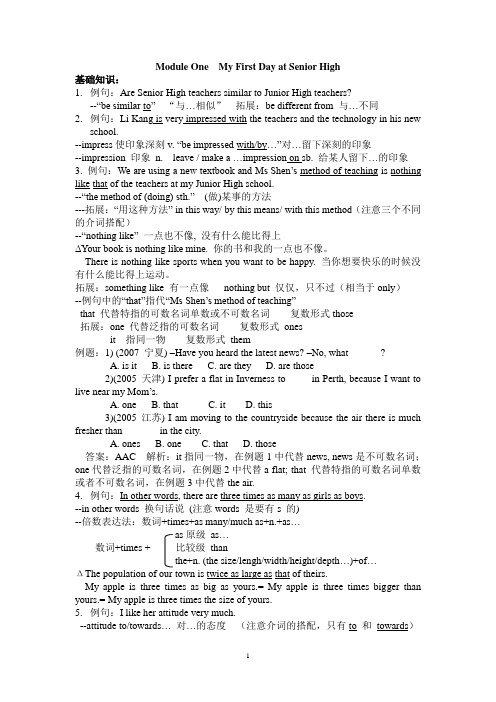
Module One My First Day at Senior High基础知识:1.例句:Are Senior High teachers similar to Junior High teachers?--―be similar to‖ “与…相似”拓展:be different from 与…不同2.例句:Li Kang is very impressed with the teachers and the technology in his newschool.--impress使印象深刻v. ―be impressed with/by…‖对…留下深刻的印象--impression 印象n. leave / make a …impression on sb. 给某人留下…的印象3. 例句:We are using a new textbook and Ms Shen’s method of teaching is nothing like that of the teachers at my Junior High school.--―the method of (doing) sth.‖(做)某事的方法---拓展:―用这种方法‖ in this way/ by this means/ with this method(注意三个不同的介词搭配)--―nothing like‖ 一点也不像, 没有什么能比得上ΔYour book is nothing like mine. 你的书和我的一点也不像。
There is nothing like sports when you want to be happy. 当你想要快乐的时候没有什么能比得上运动。
拓展:something like 有一点像nothing but 仅仅,只不过(相当于only)--例句中的―that‖指代―Ms Shen’s method of teaching‖that 代替特指的可数名词单数或不可数名词复数形式those拓展:one 代替泛指的可数名词复数形式onesit 指同一物复数形式them例题:1) (2007 宁夏) –Have you heard the latest news? –No, what ______?A. is itB. is thereC. are theyD. are those2)(2005 天津) I prefer a flat in Inverness to ____ in Perth, because I want to live near my Mom’s.A. oneB. thatC. itD. this3)(2005 江苏) I am moving to the countryside because the air there is much fresher than_______ in the city.A. onesB. oneC. thatD. those答案:AAC 解析:it指同一物,在例题1中代替news, news是不可数名词;one代替泛指的可数名词,在例题2中代替a flat; that 代替特指的可数名词单数或者不可数名词,在例题3中代替the air.4.例句:In other words, there are three times as many as girls as boys.--in other words 换句话说(注意words 是要有s 的)--倍数表达法:数词+times+as many/much as+n.+as…as原级as…数词+times + 比较级thanthe+n. (the size/lengh/width/height/depth…)+of…ΔThe population of our town is twice as large as that of theirs.My apple is three times as big as yours.= My apple is three times bigger than yours.= My apple is three times the size of yours.5.例句:I like her attitude very much.--attitude to/towards…对…的态度(注意介词的搭配,只有to 和towards)6. 例句:I am looking forward to doing my homework.--look forward to doing sth. 盼望做某事(注意此短语中to是介词,后边动词要用动词的ing形式)7.例句:Would you mind answering the questions for me?--would you mind sb./sb’s doing? 你介意..?拓展:上述结构还可转换为--would you mind if sb did…? --Do you mind if sb do…? ΔWould you mind (me/my) opening the door? = Would you mind if I opened the door? = Do you mind if I open the door? 你介意我打开门吗?8.例句:At the end of twelfth grade, American students receive the high schooldiploma.at the end of…在…结束的时候,在…的尽头拓展:in the end 最后,最终(不能和介词of连用)9.例句:The school year is divided into two semesters, the first of which is September through December, and the second January through May.--be divided into 被分成…拓展:divide into 把整体分成若干部分,就像切蛋糕separate from 把临近的个体分隔开,就像英国法国被英吉利海峡分开一样10.例句:We take part in all kinds of after-school activities.take part in 参加拓展:join 加入并成为一员如:join the Party/League(团)/club/armyJoin sb. in (doing) sth. 加入某人做某事11.例句:I don’t think I will be bored in Ms Shen’s class!否定转移的宾语从句满足的条件:1)主语是第一人称I/we; 2)主句时态为一般现在时;3)主句谓语动词是think, believe, suppose, expect,image 要同时满足以上三个条件,缺一不可,这个时候才被视为否定转移。
外研社版高一英语必修1 module1 MY FIRST DAY AT SENIOR HIGH总结
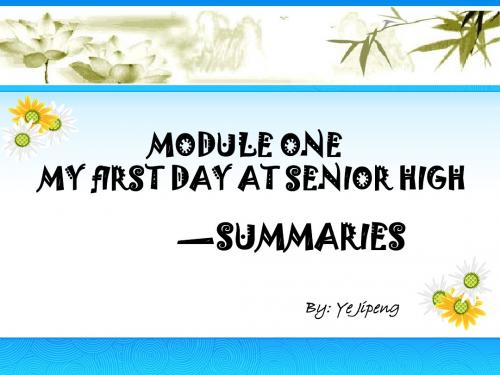
1) capital n./adj. 首都,省会,大写字母 2) write down...on... 在...上记下... 3) be/become enthusiastic about sth. 热衷于,对...有热情 to sb. 4) ...a woman called Ms Shen... 过去分词做后置定语
Page 2-2 :
5)instruction n.(常pl.) 指导,指示,说明书 follow one's instructions 服从某人的指示 instruct sb.to do vt. 命令某人做 instruct sb.in sth. 教某人做
Page 2&2-My first day at senior high:
Page 2-2 :
5) with this/that method 用这/那种方式; by this/that means 通过这/那种方式 in this/that way 6) tell a joke/jokes a lie/lies a story/stories the truth 7) find sth.(it) adj.
第一人称必须前移,反问从句主语;第二三人称反问主句主语。
9) introduce A to B 把A介绍给B introduce oneself 自我介绍 10) by oneself 单独地,独自地 for oneself 亲自地
11) in other words 换句话说,也就是说
12) look forward to doing/sth. 盼望...
Grammar 2-V.ing & V.ed:
1) V.ed形式,译为“感到...”,是在描述主观 感受; 2) V.ing形式,译为“令人...”,是本身给外界 的感受; 3) 如果是由于受到外界影响,人的表情 (expression, look)、嗓音(voice),眼神(eye) 等有变化,也用V.ed形式来修饰。
高中英语必修一第一模块语法归纳(外研版)

必修一外研第一模块语法归纳一般现在时、现在进行时、-ing形容词和-ed形容词的用法考点1:一般现在时的用法1.表示经常性、习惯性的动作。
句中常出现often, usually, sometimes, always, every day等状语。
▶ He goes to school at seven o'clock every day. 他每天七点去上学。
▶ She always takes a walk in the evening. 她常在晚间散步。
▶ We always care about and help each other. 我们总是互相关心、互相帮助。
2.表示普遍的真理、科学事实,也用在格言中。
▶ Light travels faster than sound. 光比声音传播得快。
▶ Actions speak louder than words. 行动比言语更为响亮。
3.在时间状语从句和条件状语从句中,通常用一般现在时代替一般将来时。
▶ When I graduate, I'll go back to the countryside. 我毕业后将回农村。
▶ They won't come to see us if it rains next Sunday. 如果下周日下雨,他们就不会来看我们了。
4.表示按规定或时刻表将要发生的动作,仅限于少数动词,如begin, leave, go, arrive, start等。
▶ The meeting begins at eight. 会议八点开始。
▶ The train starts at nine in the morning. 火车早上九点出发。
5.表示主语的特征、性格或说话时的感觉、状态。
▶ This job calls for great patience. 这项工作需要极大的耐心。
▶ I feel very cold. 我感觉很冷。
外研社版高一英语模块一(Module 1)知识点
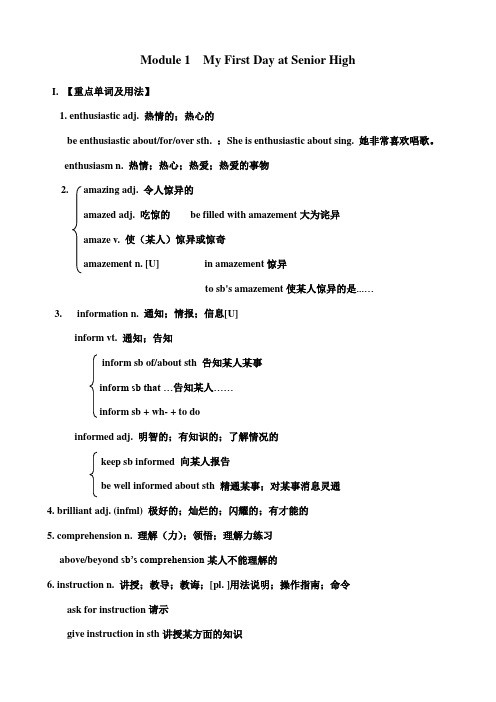
Module 1 My First Day at Senior HighI. 【重点单词及用法】1. enthusiastic adj. 热情的;热心的be enthusiastic about/for/over sth. :She is enthusiastic about sing. 她非常喜欢唱歌。
enthusiasm n. 热情;热心;热爱;热爱的事物2. amazing adj. 令人惊异的amazed adj. 吃惊的be filled with amazement大为诧异amaze v. 使(某人)惊异或惊奇amazement n. [U] in amazement惊异to sb's amazement使某人惊异的是...…3. information n. 通知;情报;信息[U]inform vt. 通知;告知inform sb of/about sth 告知某人某事inf orm sb that …告知某人……inform sb + wh- + to doinformed adj. 明智的;有知识的;了解情况的keep sb informed 向某人报告be well informed about sth 精通某事;对某事消息灵通4. brilliant adj. (infml) 极好的;灿烂的;闪耀的;有才能的5. comprehension n. 理解(力);领悟;理解力练习above/beyond sb’s comprehension某人不能理解的6. instruction n. 讲授;教导;教诲;[pl. ]用法说明;操作指南;命令ask for instruction请示give instruction in sth讲授某方面的知识give instructions (to do sth/that clause) 指挥/命令(做某事)follow the instructions 遵照用法说明7. method n. 方法;办法;条理;规律have method in one’s madness 貌似疯狂而实有理智的行为[ in this way; by means of; with this method]8. bored adj. 无聊的;无趣的;感到厌烦的(通常用来说明人)boring adj. 令人厌烦的(常指事物,也可指人): a boring evening 一个百无聊赖的晚上bore v. 使厌烦;使烦恼bore sb with sth 用某事烦扰某人be bored with sth 对……感到厌烦bore sb to death/tears 令某人极度厌烦9. attitude n. 态度;看法attitude to/towards … 对……的态度take an attitude of …采取……的态度10. behaviour (behavior) n. 行为;举止behave行为;举止;守规矩behave well, badly (towards sb) (对某人)表现好/坏behave oneself 表现得体11. previous adj. 以前的;从前的: We had met on a previous occasion. 我们上次见过面。
- 1、下载文档前请自行甄别文档内容的完整性,平台不提供额外的编辑、内容补充、找答案等附加服务。
- 2、"仅部分预览"的文档,不可在线预览部分如存在完整性等问题,可反馈申请退款(可完整预览的文档不适用该条件!)。
- 3、如文档侵犯您的权益,请联系客服反馈,我们会尽快为您处理(人工客服工作时间:9:00-18:30)。
基础学习1.词汇记忆1.1反复阅读,强化记忆(学会使用单词);1.2单词-读音-音标,三者记忆时相辅相成;1.3做好计划,利用零散时间,反复阅读。
Module 1 词汇词组academic [,ækə'dɛmɪk]adj. 学院的,学术的province ['prɒvins] n.省enthusiastic [in,θju:zi'æstik] a.热情的amazed [ə'meizd] adj.惊讶的amazing [ə'meiziŋ] a.令人吃惊的information [,infə'meiʃən] n.信息,通知website [ web’sait]n.网站brilliant ['briljənt] a.(口语)极好的comprehension [,kɒmpri'henʃən] n.理解instruction [in'strʌkʃən] n.(常复)指示,说明method ['meθəd] n.方法bored ['bɒ: d] adj.厌倦的embarrassed [im'bærəst] a.尴尬的embarrassing [im'bærəsiŋ]adj.使人尴尬的attitude ['ætitju:d] n.态度behavior [bi'heivjə] n.行为,举止previous ['pri:viəs] a.以前的adv.以前description [di'skripʃən] n.描述technology [tek'nɒlədʒi] n.技术impress [im'pres] vt.给…深刻印象correction [kə'rekʃən] n.改正encouragement [in'kʌridʒmənt] n.鼓励enjoyment [in'dʒɒimənt] n.享受,乐趣fluency ['flu:ənsi] n.流利misunderstanding[,misʌndə'stændiŋ]n.误解disappointed [,disə'pɒintid] adj.失望的disappointing [,disə'pɒintiŋ]adj.令人失望的system ['sistəm] n.系统;制度teenager ['ti:nidʒə] n.青少年disappear [,disə'piə] vi.消失move [mu:v] vt.搬家,移动assistant [ə'sistənt] n.助手cover ['kʌvə] vt.包括n.盖子diploma [di'pləumə] n.毕业文凭,学位证书重点词组in other words 换句话说look forward to doing sth. 期待;盼望look for 寻找be impressed with 对…印象深刻be different from 与…不同at the start of 在……开始的时候at the end of 在……结束的时候be divided into 被(划)分成……take part in 参加2.语法基础2.1语法入门主语:句子或者句意的主要人物或事物,一般在句首。
主语的成分有名词(如boy),主格代词(如you),动词不定式,动名词等。
谓语:谓语由动词构成,是英语时态、语态变化的主角,一般在主语之后。
不及物动词(vi.)没有宾语,形成主谓结构,如:We come.宾语:宾语位于及物动词之后,一般同主语构成一样,不同的是构成宾语的代词必须是‘代词宾格’,如:me,him,them等例:The boy needs a pen.定语:对主语或者宾语的修饰。
汉语中常用‘……的’表示。
定语通常位于被修饰的成分前。
副词用作定语时须放在名词之后。
_________作定语:The little boy needs a blue pen._________作定语:Two boys need two pens.___________________作定语:His boy needs Tom\'s pen.___________作定语:The boy needs a ball pen.状语:主语处于一种什么状态。
状语修饰动词、形容词、副词或全句,说明方式、因果、条件、时间、地点、让步、方向、程度、目的等。
状语在句子中的位置很灵活,常见情况为:通常在句子基本结构之后,强调时放在句首。
有时状语在句中的某个位置会引起歧义,应注意。
如:The boy calls the girl in the classroom._________状语:The boy needs a pen now. /Now, the boy needs a pen. /The boy, now, needs a pen.补语:补充说明信息和情况。
补语,就是补充说明的语言,英语中一般有主语补语和宾语补足语,主语补语很少提及,宾语补足语倒是句子的常见组成部分。
例一Please don't call me fat.例二They made the girl cry.2.2词法名词(n),动词(v),形容词(adj),副词(adv),冠词,代词,介词MODULE 1 精讲3.1. I like Chinese because I enjoy reading stories and poems.非谓语动词做宾语——v.ing & to do sth.enjoy doing…… 喜欢做只能接动名词做宾语:enjoy imagine can`t help喜欢想象禁不住3.2. I live in shijiazhuang,a city not far from Beijing.(1)a city not far from Beijing是shijiazhuang的同位语(2)比较级:far—farther—farthestI can throw the ball farther than you can.(3)far表示不确切的距离,表示距离的数量词不能与它搭配。
判断:She lives five miles far from here.She lives five miles from here.She lives far from here.3.3.The teachers write on the computer, and their words appear on the screen be hind them.appear 常用作不及物动词或连系动词,表示“出现,显现”,后接不定式、形容词或从句。
appear做连系动词,表示“似乎,显得”。
It appears that she will win.3.4. And we have fun.(1)have fun 玩得开心,快乐(2)have fun (in) doing sth. 做某事是快乐的have fun with sb. 和某人在一起是快乐的The children were having a lot of fun with the building blocks.3.5. I'm looking forward to doing it!look forward to sth./doing sth. 期待着某事/做某事”,其中“to”是介词。
动词+介词to构成的常用短语有:turn to 求助于;转向;翻到…… pay attention to 注意…… belong to 属于3.6.The teachers are very enthusiastic and friendly and the classrooms are amazi ng.(1) be enthusiastic about sb./ sth. 对…热心/着迷Zheng chi is enthusiastic about football games.(2) amazing adj. 令人吃惊的It is amazing that you can`t swim.(3) 以-ing和-ed结尾的形容词用法:例She is an ____ (interest) writer, and I`m ____(interest) in the subjects that she ____(write) about.以-ing和-ed的结尾的形容词,常用来表示―特征‖和―状态‖。
形式是动词的过去分词和现在分词,但是实际上却是形容词。
常见的有:tired/tiring, satisfied/satisfying, interested/interesting, disappointed/disappointing, pleased/pleasing等。
–ed结尾的形容词,通常用于说明句中主语(人)的情绪变化,对人和物的态度感受,常译为―某人感到……的‖;-ing 结尾的形容词,主要用于说明事物,表示事物的性质或特征,若用它们说明人,则表示此人具有此性质或特征。
通常译为―令人……的‖。
He is not interested in politics.The book is very interesting.比较:He is frightened. He is frightening.3.7. The teacher is a very enthusiastic woman called Ms Shen.例The players ________ from the whole country are expected to bring us honor in this summer game.A. selectingB. to selectC. selectedD. having selected(1)called Ms Shen 过去分词短语作定语,与所修饰的词逻辑关系上存在被动关系,相当于定语从句的who/ that is called Ms Shen.We visited the new library built three weeks ago.(2)过去分词作定语,与所修饰的词逻辑关系上存在被动关系;现在分词作定语,与所修饰的词逻辑关系上存在主动关系。
